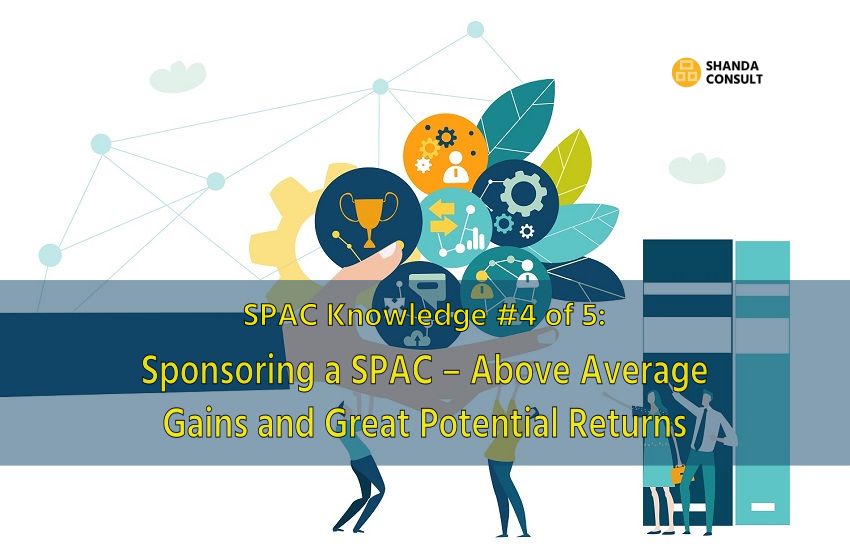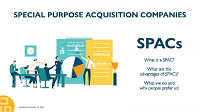SPACs – Lucrative for Pre-IPO Investors
Pre-IPO investors - sponsors - receive founder shares and warrants
SPACs – Potentially high gains and returns for sponsors
Why Choose a pre-IPO SPAC Investment a.k.a. Sponsoring?
Please read more about SPACs and our SPAC services on our dedicated SPACs website.
Over the past few years, both individuals and institutional Private Equity (PE) investors discovered the extraordinary opportunities of investing in SPACs in the pre-IPO stage. For pre-IPO SPAC investors, also called sponsors, SPACs represent a powerful investment alternative in times of zero-interest bonds and tumbling stock markets.

SPACs, or Special Purpose Acquisition Companies, are companies without a business but with a promising acquisition strategy and an excellent board. These ideas and professional assets are in-place when a SPAC is listed on a public exchange, then floated via an IPO (Initial Public Offering).
Both the acquisition strategy and the excellent board are key in convincing large institutional investors to deploy substantial funds on the first day of the IPO. Institutional investors are typically pension funds, sovereign wealth funds and hedge funds, from the US, Europe, and other countries.
When a SPAC is listed on a stock exchange in the US, it needs to provide its own capital upon issuing the IPO. A SPAC’s capital must not be less than 5.1% of the planned IPO proceeds that will be raised from other investors, e.g. if IPO proceeds from institutional investors are on target to be USD $100 million, a SPAC must provide additional USD $5,100,000.
The (natural or corporate) persons providing this pre-IPO capital are called sponsors, and the capital provided by them is called sponsor capital.
Typical SPAC Sponsor Profiles
Depending on their interest and motivation, SPAC sponsors can be categorized into three groups:
- Experienced business executives who have project ideas and wish to realize larger projects but lack the funds to do so.
- Companies that wish to raise substantial funds from the capital markets for projects of group companies.
- Private investors or PE investment funds. These investors may want to be SPAC sponsors to benefit from potential gains and returns on the day of the IPO, and also during and after the later acquisitions of a SPAC.
If company owners, groups of owners, any innovator who has project ideas that tens or hundreds of millions of USD may choose SPACs to raise funds from large institutional investors through an IPO.
These groups typically act as sponsors of a SPAC and provide the necessary sponsor capital. Sponsors of this kind may also be looking for co-sponsors if their own funds are not enough to provide the necessary sponsor capital.
Companies that wish to raise substantial funds to realize their own projects or group companies’ projects may use SPACs to raise the necessary funds from the capital markets, instead of doing a normal IPO.
Compared with a normal IPO, SPACs are cheaper and faster. A traditional IPO may take at least one and a half years to organize and could easily cost ten percent or more of the planned IPO proceeds. In contrast, a SPAC usually requires three to five months until the IPO is ready, and the costs are remarkably lower.
Private investors or PE investment funds’ motivation is creating returns, and not their own project ideas or projects. This type of sponsor invests in SPACs at the pre-IPO level to participate in the enormous gain and return potential of SPACs. This type of sponsor may provide the entire sponsor capital needed or may also look for additional co-sponsors.
Private investors will be on the board of a SPAC, and as a result, can exercise some control over the funds they invested. PE investment funds like the advantage of having a clear – and legally defined – exit strategy when sponsoring a SPAC, as opposed to direct investments in shares of non-listed companies.
Potential Gains and Returns for SPAC Sponsors
All the information presented below is based on SPACs set up by Shanda Consult and its team of associates. The benefits that Shanda Consult offers to sponsors are generally superior to other service providers. You will find comparative information in brackets.
SPAC Sponsors Receive SPAC Founder Shares
In return for sponsoring a SPAC in its pre-IPO stage, sponsors receive 25% of the SPACs founder shares. (The common percentage is 20%, while SPACs set up by Shanda Consult provide the sponsors with 25% founder shares.) The 25% of SPAC founder shares held by the sponsor will provide the sponsor with 22.5% capital growth during the IPO.
How do Founder Shares Work?
On the day of IPO, all SPAC founder shares are transformed to (exchanged with) listed common shares at a ratio of one-fourth of the IPO’s proceeds.
For example:
A SPAC plans to collect USD $100 million IPO from institutional investors.
Institutional investors have been attracted to the company during the preceding roadshow and have committed to making investments. That’s the starting signal to get the SPAC listed as a public company and float its IPO.
On the day of IPO, 10,000,000 common shares at USD $10 are offered and bought by institutional investors, who buy these shares for USD $100 million. Using a share price of USD $10 is common practice for SPAC IPOs.
Simultaneously, all the founder shares of the SPAC are exchanged with listed common shares of the SPAC, in addition to the 10,000,000 common shares mentioned above. The amount of listed common shares in exchange with the SPAC’s founder shares is always one fourth (= 25%) of the listed common shares offered and sold to the institutional investors.
In our example that will result in 2,500,000 listed common shares at a value of USD 10 each, with a total value of USD 25,000,000.
These listed common shares with a total value of USD $25,000,000 belong to the SPAC’s pre-IPO shareholders. As 25% of the pre-IPO SPAC founder shares belong to the SPAC sponsor, the SPAC sponsor is now holding 25% of the 2,500,000 exchanged shares, which is 625,000 listed common shares at a total value of USD $6,250,000.
In a nutshell, the SPAC sponsor received listed common shares at a value of USD $6,250,000 in exchange for his/her USD $5,100,00 sponsor capital provided, providing a capital growth of 22.5%.
SPAC Sponsors Also Receive Warrants
SPAC sponsors receive one full share warrant for each Dollar of sponsor capital provided (The common warrant for SPAC sponsors is often a 1/4 share or 1/2 share warrant, while SPAC sponsors of SPACs set up by Shanda Consult receive full share warrants).
The standardized execution price of SPAC warrants is USD $11.50, which means that warrant holders may redeem their warrants by buying listed common shares at a price of USD 11.50, no matter at what price the common shares of the SPAC are trading at on the stock exchange.
Depending on the arrangement, warrants may be redeemed either – not earlier than 30 days after a successful acquisition by the SPAC or 12 months after the IPO.
It is not unusual for the value of listed SPAC shares to increase to USD $15 to $18 during the hot pre-acquisition phase, if the acquisition is a promising one, and if the SPAC management communicates the planned acquisition well through its PR activities.
It is also possible for the value of listed SPAC shares to increase to USD $20 (or more) after a successful acquisition takes place. The warrant holders may then redeem their warrants by buying listed common shares of the value of, for example, USD $18.00, while only paying the execution price of USD $11.50.
Should a sponsor not be able to pay USD $11.50 per warrant to receive his/her listed shares of the value of, for example, USD $18.00, Shanda Consult may be able to arrange for a short-term bridge loan with the underwriting bank.
Warrants may also be traded on the secondary market. Additionally, warrants can be sold to other shareholders of a SPAC. Institutional investors of a SPAC may be interested in buying sponsor warrants at a discounted price.
Please keep in mind: The success of a SPAC’s acquisitions depends on the board of the SPAC. If the SPAC board fails to execute acquisitions that are beneficial for the SPAC, a SPAC’s traded shares will not gain value. Consequently, warrants would become worthless.
SPAC Sponsors Benefit from Rising Share Prices
The value of public SPAC shares traded on stock exchanges typically remains more or less at the level of its initial offering price for some period after the IPO. Trade volumes during that period are generally low.
Once a SPAC identifies meaningful acquisition targets and is engaged in advanced negotiations with the shareholders of an acquisition target company, the SPAC board will publicly communicate this development through its PR activities.
This public communication will raise investor interest in the SPAC, and demand for the shares is also likely to jump. Consequently, the share price will probably increase. The closer a SPAC comes to the finalization of a deal, the more the share price is likely to increase.
Once a deal has been closed, meaning that the acquisition has been decided and the De-SPAC transaction takes place, the wider public will become aware of the successful transaction as communication channels grow exponentially (many service providers like brokers, banks, funds, etc. are communicating or advertising the success of the shares and its further potential).
A successful acquisition will typically give the share price another push, which adds value to anyone who bought shares in the SPAC, and also the sponsors.
Talk to Shanda Consult for More Information!
Sponsoring a SPAC can be a great investment, but it takes professionals to make the entire SPAC process a success. If you are interested in learning more about how we can help you sponsor a SPAC, or if you want to invest in a SPAC, we can help.
Shanda Consult has deep connections in the investment banking industry, and we know how to get the most out of a SPAC for everyone who is involved. We are happy to talk to you, your investment team, or your company about what SPACs have to offer investors and potential sponsors!
Brief SPAC introduction of SPACs (new, Feb 2020)
“What is a SPAC? What are the advantages of SPACs? What do we do and why people prefer us!
You are welcome to contact us through the contact form below to have a chat what we can do for you.
Our currently hot SPACs:
LENUS BIOSCIENCES
Our LENUS BIOSCIENCES SPAC focuses on investments in the nanotech medical cannabis industry.
The HEIDI SPAC: Smart Energy with Blockchain & AI
HEIDI, a SPAC focused on the acquisition of promising companies with forward-looking technologies and a track-record in energy production or distribution.


